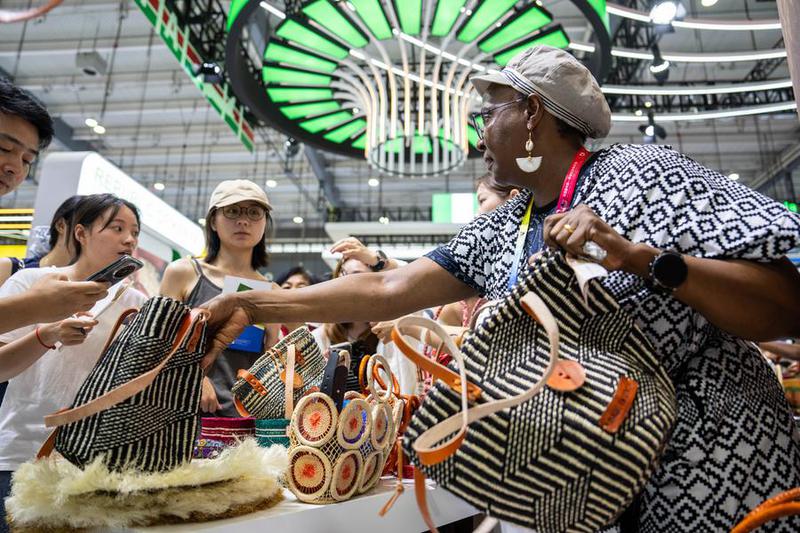
At the fourth China-Africa Economic and Trade Expo held last week in Changsha, Hunan province, a steady stream of visitors crowded around a South African booth, drawn by the vibrant display of bottled condiments.
Inside the booth stood Isabella, an exhibitor attending her first-ever trade show in China. She proudly offered samples of her signature mango atchar — a tangy pickled condiment made from green mangoes.
"Many people in China may not be familiar with mango atchar, so I brought it to share its unique taste and flavor. I hope our products can find a place in the hearts of Chinese consumers," she said.
READ MORE: China, Africa pledge to strengthen trade ties
For Isabella and many others, the expo is more than a business showcase — it is a gateway to new markets, partnerships and shared growth.
The expo, first launched by President Xi Jinping at the 2018 Beijing Summit of the Forum on China-Africa Cooperation, was designed to deepen trade and economic ties between China and the African continent.
China has remained Africa's largest trading partner for 16 consecutive years, with bilateral trade reaching a record high of nearly $300 billion in 2024. As economic ties continue to expand, exchanges like the expo are helping to drive a broader and more inclusive modernization agenda — one that bridges traditional industries and emerging sectors.
Zanele Sanni, chief director of export promotion and marketing at the Department of Trade and Industry in South Africa, said her delegation is very excited to introduce the diversity of South African goods and services to the Chinese people.
Besides the high-quality exports, she said South Africa has also brought services-oriented companies, including those specializing in geo-positioning, satellite services and infrastructure engineering.
Reflecting on the expo's theme, "China and Africa: Together Toward Modernization", she quoted a South African proverb: "A person is a person because of other people." For her, this encapsulates the spirit of unity and collective progress that characterizes the partnership between South Africa and China, and indeed between Africa and China.
China has always championed a vision of shared modernization. Xi has emphasized on many occasions that with China and Africa combined accounting for one-third of the world's population, there can be no global modernization without the modernization of the two sides.
At the FOCAC summit in Beijing in September, Xi announced a 10-point partnership action plan, with a view to deepening China-Africa cooperation and jointly leading the modernization of the Global South.
In a congratulatory message to the recent Ministerial Meeting of Coordinators on the Implementation of the Follow-up Actions of FOCAC, also held in Changsha, Xi reaffirmed China's commitment to providing new opportunities for the world through the achievements of Chinese modernization, and to offering new impetus to partners in the Global South, including Africa, by leveraging its vast market.
He pledged China's readiness to implement zero-tariff treatment for 100 percent of tariff lines for all 53 African countries that have diplomatic relations with China, and to provide greater convenience for the least-developed countries in Africa to export to China.
In the nine months since the Beijing summit, early results are emerging. Official data showed that China's new investment in Africa has exceeded 13.3 billion yuan ($1.85 billion), with total financial support exceeding 150 billion yuan.
China has signed framework agreements on economic partnership for shared development with over 20 African countries and provided trading finance worth approximately 17.12 billion yuan to support African exports.
These policy measures and tangible outcomes have drawn praise across Africa. Amon Murwira, Zimbabwe's minister of foreign affairs and international trade, said President Xi has set a clear direction for China-Africa cooperation, describing it as a "philosophy of cooperation" that is driving a new global reality of shared modernization.
He welcomed China's zero-tariff policy, calling it a "significant step forward", especially at a time when "certain countries of the world are putting up barriers to trade."
Somali Foreign Minister Ahmed Moallim Fiqi said the Changsha declaration, adopted at the FOCAC coordinators' meeting, has demonstrated China's sincerity in building long-term partnerships with Africa.
In the Changsha declaration, China, 53 African nations and the African Union Commission collectively called for more inclusive and equitable globalization, and urged the international community to uphold true multilateralism, as rising unilateralism, protectionism and economic coercion are having an impact on global development.
Angola's Minister of Industry and Trade Rui Miguens de Oliveira emphasized that China has been a reliable partner throughout Angola's history — from independence to post-war reconstruction.
"Today, as Angola faces new development challenges, China's decision to remove tariffs on African imports is particularly significant," he said. "We believe all major economies should take note of this step."
Carlos Martinez, a British author and independent political commentator, described the Changsha declaration as "a strong reaffirmation of the principles of solidarity, cooperation and mutual benefit that underpin China's relations with Africa, and a powerful statement against the US' attempts to divide the Global South."
ALSO READ: China-Africa expo seals $11.4 billion in deals
While the United States is "putting up tariff barriers, China is tearing them down", he said in a social media post. "While the US wants to hold Africa in underdevelopment, China is helping Africa modernize. While the US has slashed development aid, China is steadily increasing its support for African development."
Li Wentao, executive director of the Institute of African Studies at the China Institutes of Contemporary International Relations, said, "China has always remained committed to openness and win-win cooperation and endeavored to advance Africa's development through high-quality practical cooperation."
Li noted that China's comprehensive industrial capacity and Africa's youthful demographics and resource endowment make the two natural partners in development.
Building on their traditional friendship, both sides uphold the principles of mutual respect and equality to deepen collaboration in modernization, he said, adding that the time-tested partnership continues to serve as a solid foundation for sustained progress.
Contact the writer at zhaojia@chinadaily.com.cn


